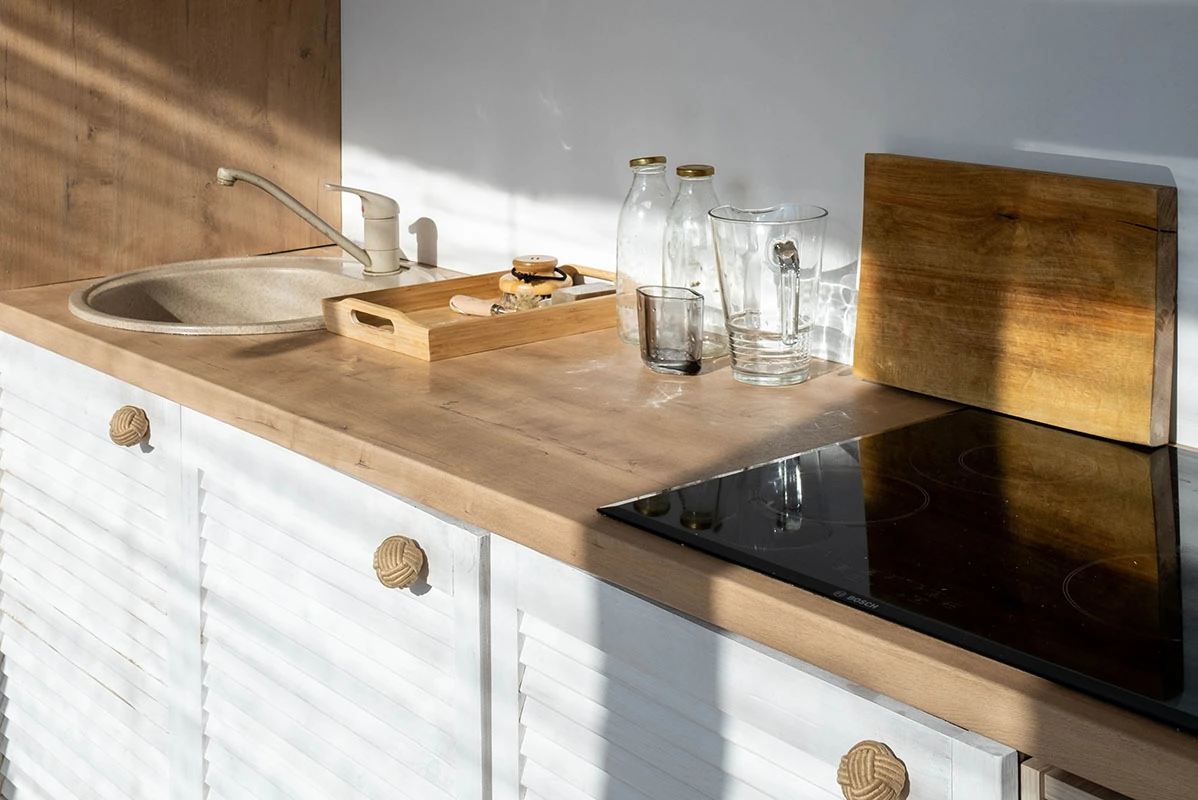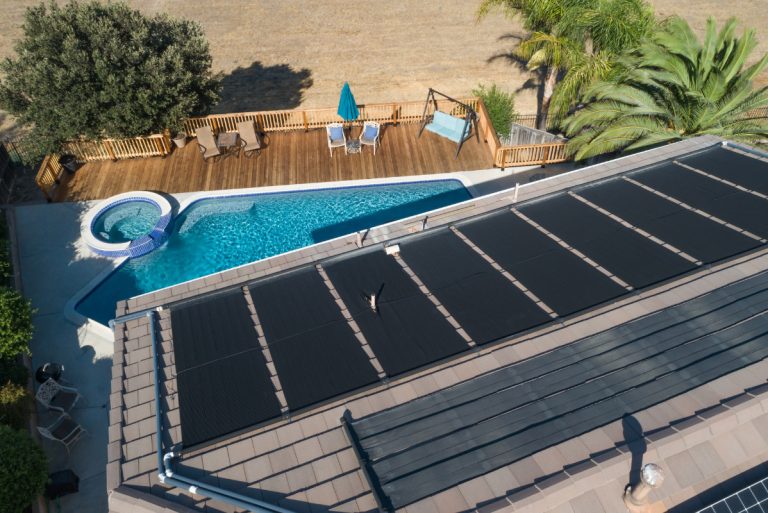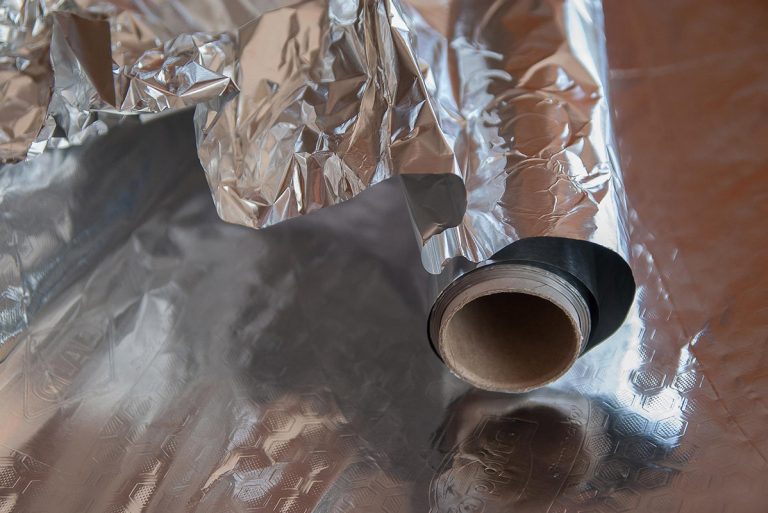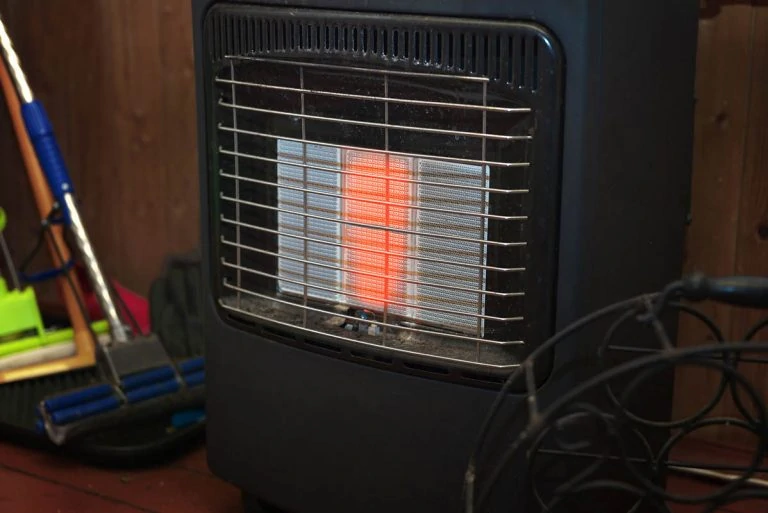If you’re building a new house or renovating a room or two, as an eco-conscious consumer, of course, you want everything to be as environmentally friendly as possible, from the heating to the lighting. Traditionally, kitchen and bathroom countertops are made from damaging materials such as plastic laminate, but luckily there are now plenty of eco friendly countertops available.
Top 11 eco friendly countertop brands
There’s a range of options when it comes to eco-friendly countertops for your kitchen or bathroom, from recycled glass and paper to bamboo. We’ve pulled together our favorite brands producing stunning, sustainable countertops from different materials.
1. Dekton
Dekton makes large-format slab surfaces from composite raw materials such as glass, quartz, and porcelain. These durable surfaces are resistant to UV, stains, scratches, and thermal shock – making them ideal for kitchens as well as bathrooms.

Dekton has a range of eco friendly counter tops, including their Natural Collection and XGloss Stonika Collection, which feature a range of tones and finishes, all inspired by natural stone. Dekton’s products are carbon neutral. Their ultracompact line has been awarded the Environmental Product Declaration (EPD) certificate. The company has Corporate Social Responsibility policies in place that support the United Nations Sustainability Goals.
Dekton is made by parent brand Consentino. Along with using recycled materials and sustainable manufacturing processes, Consentino also partners with nonprofit group Equilibro Marino, which is working to clear the Mediterranean Sea of microplastics, disposed fishing nets, and other waste.
2. Paperstone
Paperstone is a surprisingly durable and heavy-duty surface made from recycled paper and resin. This non-porous surface is made from 100% post-consumer recycled paper and petroleum-free resin and is stain-resistant, attractive, and warm to the touch.
This material is also easy to shape and work with, so it can be crafted into a range of countertops and other surfaces.

Along with using recycled and sustainable materials, Paperstone uses sustainable practices as part of their manufacturing process, such as recycling water and day-lighting the factory with skylights.
Additionally, the brand takes any leftover glass or cement that it can’t use for production and recycles it into roadbeds. Overall, their manufacturing facility currently recycles over 90% of its waste and is working towards becoming zero-waste.
3. Cambria
Cambria’s countertops look just like natural stone, thanks to their manufacturing processes which produce slabs with varied grain, mineralization, and colors. The brand’s products are made in the USA, and they are committed to environmentally-friendly methods from mining their raw materials to manufacture and transport of finished products.

The brand’s countertops contain one of the highest concentrations of pure quartz, creating strong and compact slabs. Their surfaces are also non-porous and non-absorbent, so they won’t draw in moisture which can foster bacterial growth.
The brand’s surfaces are safe, non-toxic, and independently certified as low-emitting by GREENGUARD, meaning they do not emit radon or any other harmful substances. The surfaces are also low-maintenance and do not need regular polishing, sealing, or re-conditioning.
4. Durat
If you’re concerned about the world’s plastic problem, you’ll be interested in how Durat uses recycled post-industrial plastics to make countertops. Durat’s countertops are a great way to use plastics that may otherwise end up in landfill (or the ocean!) and are 100% recyclable.

Durat’s countertops are available in over 70 different colors, but if that’s not enough, you can have them tinted in a custom color to order. They are highly durable, and resistant to wear and humidity.
They’re also low maintenance – to renew your Durat countertops, all you have to do is give them a light sanding.
5. Icestone
Icestone is another brand that makes elegant countertops from recycled glass: it says they’ve diverted over 13 million pounds of glass from landfill since they launched in 2003.

Made in the USA, their countertops are made from recycled glass, Portland cement, and non-toxic pigments. They are produced by the same parent brand as Paperstone, and so follow the same sustainable processes, from recycling water in their manufacturing facility to recycling 90% of their factory waste.
6. Teragren
Teragren makes countertops and other surfaces from Moso bamboo, one of the densest, hardest forms of bamboo. The brand works with family farmers to harvest bamboo by hand when the Moso bamboo is at peak density for the strongest and most durable surfaces possible.
Teragren manufactures their countertops in the same area where the bamboo is harvested and uses thoughtful transportation options for their finished products, such as ocean shipping with Clean Cargo member carriers. Their bamboo products are actually carbon negative, thanks to the carbon captured and sequestered in the material.

Bamboo is generally a sustainable material because fast-growing bamboo regenerates quickly and does not require a large amount of water or pesticides.
These countertops have a stunning, natural finish that is twice as hard as maple. These surfaces are so durable that the manufacturer recommends you don’t cut food on them, only because the hard bamboo can dull your knives!
Remember that Terargren’s countertops arrive unfinished so you’ll need to cut and finish them yourself, though this also makes them very customizable.
7. Interceramic
Interceramic makes a range of stone and ceramic surfaces. Although they focus mostly on floor tiles, their granite slabs make excellent countertops, being stylish and highly durable.
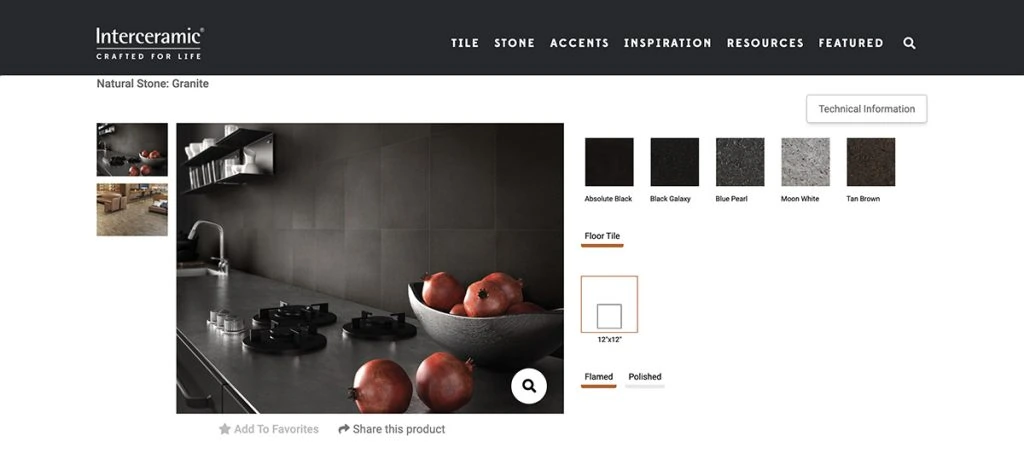
Granite is a popular choice for countertops but is reasonably energy intensive to mine, so it’s not the most eco-friendly material. However, if you have your heart set on granite, Interceramic is a good choice as a reputable US-based company that emphasizes environmental preservation.
8. Silestone
Silestone produces sustainable countertops made of a hybrid of minerals, quartz, and recycled materials. This combination has a stunning depth of color while being highly durable and eco-friendly.

Made by parent brand Cosentino who also makes Dekker countertops, Silestone uses HybriQ technology to create a hybrid mix of natural and recycled materials that reduce the crystalline silica content by 50% to 90%, depending on the color.
Their Sunlit Days collection is inspired by the natural shades of the Mediterranean region and is produced using 99% reused water, 100% renewable electric energy, and at least 20% recycled raw materials.
These countertops are also safe and hygienic. The brand has a number of certifications that demonstrate their products are high-quality, safe, and eco-friendly including from the GREENGUARD Environmental Institute, ISO 14001, and NSF.
9. ALKEMI
ALKEMI surface materials are made from post-industrial scrap materials: their ALKEMI acrylic surfaces contain 84 – 97% recycled scrap aluminum, copper, solid surface, and acrylic.

These materials are certified as sustainable by Scientific Certification Systems, and not only avoid the environmental impacts of producing alternative materials such as concrete or plastics but are a safe way to use industrial scrap. For example, aluminum usually produces a large amount of air pollutants when conventionally recycled but is safely used in ALKEMI surfaces.
ALKEMI products are made by Renewed Materials Inc., which is a member of the U.S. Green Building Council and is committed to developing construction processes that create sustainable and healthy buildings.
10. Richlite
Richlite is another brand that makes surfaces from post-consumer recycled paper. Their GREENGUARD and FSC-certified products are made from sheets of recycled paper stacked together and saturated with a phenolic resin.

The material is set under heat and pressure in a process that involves zero off-gassing. They also use other sustainable practices in the manufacturing process, such as recycling the energy produced during manufacturing into the heating process.
Richlite is waterproof, flexible, and highly-durable. In fact, it was first used by the U.S. military in 1943 to make the boxes that were dropped from supply planes. This makes it well-suited to kitchen and bathroom countertops.
11. Vetrazzo
Vetrazzo countertops are made of 85% recycled glass, along with binders, pigments, and other recycled materials. The majority of this glass is sourced from neighborhood curbside programs, so the glass bottles you put out for recycling could be used to make your kitchen or bathroom countertops!

Vetrazzo products are handmade in the USA, with recycled glass carefully selected for quality and sustainability. Because the slabs are made by hand, each is unique, high-quality, has an artistic flair, and are available in a range of colors.
Eco-friendly countertop FAQs
With so many different types of materials available, it can be confusing to choose the right sustainable countertop for your kitchen or bathroom. Below we cover the most commonly asked questions to address these concerns.
What are the most eco-friendly materials for countertops?
The most sustainable materials are arguably recycled ones such as recycled glass, recycled paper, and post-consumer recycled paper. Recycled materials not only do not need energy for manufacture because they’re already in existence, and repurposing them saves waste from ending up in landfill.
Bamboo is also a very sustainable choice for countertops, while granite is somewhat sustainable – although it is a natural material, it requires a fair amount of energy to mine.
On the other hand, concrete takes a great deal of energy to produce meaning this material produces even more carbon dioxide.
Any locally quarried or manufactured material is more eco-friendly as it takes less energy and produces less greenhouse gas emissions to transport to your door.

Materials made from wood, including laminate and stainless steel countertops that use wood as a base, also store carbon and so reduce carbon emissions. This is also the case for bamboo, but bamboo is generally more sustainable than wood as it is fast-growing, while wooden materials contribute to deforestation if not sustainably-sourced.
Longevity is also important – a highly durable and long-lasting countertop such as Richlite is more sustainable as you won’t need to replace it as often.
Are quartz countertops eco-friendly?
Quartz is a natural material that is durable and long-lasting, as well as being recyclable. Therefore, quartz countertops are eco-friendly, but this depends on the other components, and how they are manufactured.
Cambria countertops, for example, have a high natural quartz content, and the brand strives for sustainable manufacturing processes, making this a pretty eco-friendly choice. Other countertops marketed as quartz are not nearly as environmentally friendly.
Are porcelain countertops eco-friendly?
Porcelain is made from natural materials such as clay and is also easy to recycle. However, you have to consider the amount of energy and water used during manufacture, which can be substantial.
Although not as bad for the environment as plastic or concrete, porcelain is not as environmentally friendly as materials such as recycled paper and resin, bamboo, or Dekton’s blend of porcelain, quartz, and recycled glass.
What is the healthiest countertop material?
Any material you have in your home needs to be safe, and this becomes doubly important when it comes to surfaces associated with food preparation.
When considering the health and safety of countertops, the most important factors are:
- Porosity – porous surfaces can absorb liquids from raw and prepared foods, and so harbor bacteria.
- Emissions – some materials can emit harmful substances such as radon, which can build up to toxic levels within your home.
- Formaldehyde content – Plastic laminate countertops can contain formaldehyde, which can cause irritation and increased risk of some cancers, according to the EPA.
- Sealing – If the material requires sealing in order to stay non-porous (such as some stone and granite countertops) how often does the seal need to be reapplied?
- “Antimicrobial” – Some countertops and advertised as antimicrobial, but this means that they contain additives that are essentially pesticides, which may be toxic without any demonstrated health benefit.
In terms of these criteria, the brands listed above all use safe materials for countertops. Some of the safest countertops available on the market today are Silestone and Cambria.
Key takeaways
If you’re building or renovating your home, it’s important to make sure every detail is kind to the environment, from the foundations to your countertops. Traditional kitchen and bathroom countertops are made from materials that can be very damaging to the environment in how they are manufactured.
Alternatives made from bamboo, recycled paper, recycled glass, and quartz hybrids are much more eco-friendly, with brands like those listed here adopting manufacturing and transportation methods that are kind to the planet.
If you’ve enjoyed this round up of the most eco-friendly countertops, take a look at our other guides to eco-friendly living, including the best lawn alternatives and the best off-grid solar panel kits.

